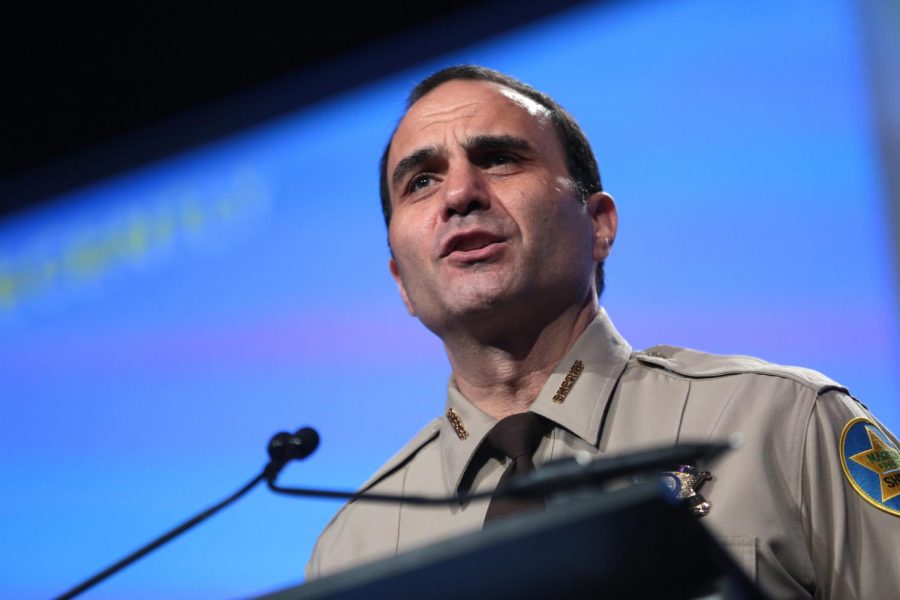Maricopa County Sheriff candidates debate profiling, ICE, other topics
Sheriff Paul Penzone
October 14, 2020
Last Friday, Sheriff Paul Penzone and former Chief Deputy Jerry Sheridan sat down for a televised debate where both were critical about the other’s plan on how to run the Maricopa County Sheriff’s Office (MCSO).
Both have prior experience in law enforcement.
Sheridan worked 38 years for the MCSO where he became chief deputy for former Sheriff Joe Arpaio and retired in 2016 when Arpaio lost re-election to Penzone, according to ABC 15 Arizona.
Penzone’s bio states that he served for 21 years with the Phoenix Police Department, seven of those with a special unit that focused on apprehending fugitives and solving cold cases, in addition to his four years as sheriff.
During the debate on Arizona PBS, the moderators asked a series of questions on topics ranging from racial profiling, the relationship that the police agency has with Immigration and Customs Enforcement (ICE), and how different the vision is from the “Arpaio era” where the integrity of the Maricopa County Sheriff’s Office (MCSO) was questioned.
Penzone was asked if deputies are still racially profiling.
According to American Civil Liberties Union (ACLU), the Melendres case caused District Judge G. Murray Snow to issue a decision in 2007 that Arpaio and his agency had relied on racial profiling and illegal detentions to target Latinos. In 2013, Judge Snow issued an order mandating necessary changes by Arpaio and his agency to prevent further misconduct and safeguard the community from future violations of their constitutional rights.
“What we’ve seen is about a four percent disparate treatment, or differential, meaning that if 100 Caucasians or 100 Hispanics are stopped for the same violation there will be four more citations issued to that category, so that in of it itself is a problem,” Penzone stated, “And right now we’re in negotiations to actually have more frequent reviews to ensure this is individualized.”
Sheridan stated that he was not involved with the Melendres case until Arpaio gave him the task to be involved.
“Coincidently, Judge Snow even said in march of 2013 that’s when the Sheriff’s office began to comply with his order when I got involved in that case,” Sheridan stated.
Moderator of the debate Steve Goldstein, host of KJZZ’s The Show, asked Penzone about the relationship between the MCSO and ICE.
“I made a commitment to remove politics from the office, so regardless of where influence may come from when you take an oath of office it is to enforce all laws with impartiality,” Penzone stated.
He added that he has compassion and empathy for DACA and looks forward to immigration reform. However, Penzone stated it is appropriate for ICE to interview inmates who have committed a state crime and have entered the United States unlawfully to then follow the due process at the immigration courts and have a judge determine what should happen next.
Sheridan stated he agreed with Penzone.
Sheridan was asked by Arizona Horizon host and managing editor Ted Simons, if he wins the election, would the “Arpaio era” return.
“Absolutely not, don’t forget, I worked for the sheriff’s office for 38 years, I worked for four different sheriffs during that time period,” Sheridan stated. “I am not Joe Arpaio, I am Jerry Sheridan. I will run the MCSO the way I finally will be able to, not the way I had to because I worked for him, the sheriff’s the boss.”
Towards the end of the debate, moderator Yvonne Wingett Sanchez from The Arizona Republic asked Penzone about the backlog of 1,800 internal affairs investigations on deputies working for MCSO awaiting resolutions.
“The priority always is that when we have a violation that is egregious and could affect the public trust or put the public at risk, that person is removed from service and put on administrative leave but the length of time and the backlog are unacceptable,” Penzone stated.
He added that every internal affairs investigation has to go through a detailed process with interviewing all witnesses and assessing the conclusion. However, some anonymous complaints have been for spiteful reasons to prevent potential promotions or trying to harm other employees in their reputation.
Penzone stated that according to their data, another 90 employees would be needed to catch up the backlog.
Sheridan said while he was subject to the same court order that Penzone is currently under, he never had a backlog and stated that Penzone is violating state law since he has not complied within the 180 day limit of finalizing each investigation.
“Just so you know, for the three years I was the Chief Deputy I was under that same court order, we had the same basic guidelines, I didn’t have this problem,” Sheridan said.
He added that the MCSO employees are afraid to make mistakes because the sheriff (Penzone) does not “have their backs” and stated there would be a lawsuit against the agency because of an arrest made on an MCSO detective who is allegedly accused of crossing ethical and legal boundaries with an alleged victim of domestic violence, calling Penzone “overzealous” and “trying to prove a point that he has so much integrity”.
Penzone’s rebuttal was that the majority of the court order came into effect once he was in office and was due to Sheridan’s actions of covering up internal investigations.
Closing statements brought the debate to an end where Penzone wants to keep progressing for full integrity and an agency that communities can trust and Sheridan mentioned he would bring back the Drug Interdiction Unit, bring back C.A.S.T. and bring back the Animal Cruelty Unit. Sheridan also said he will review jail policies and bring back nobility to law enforcement “to better protect people”.


